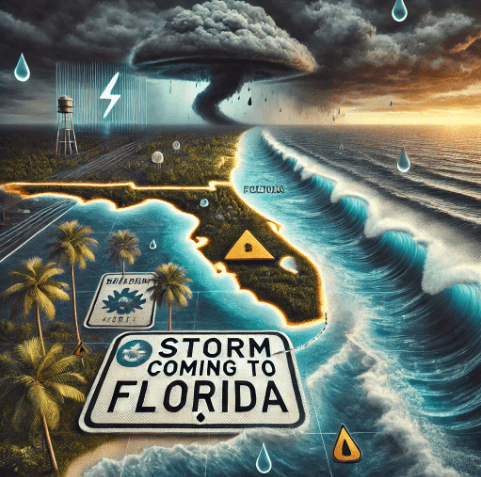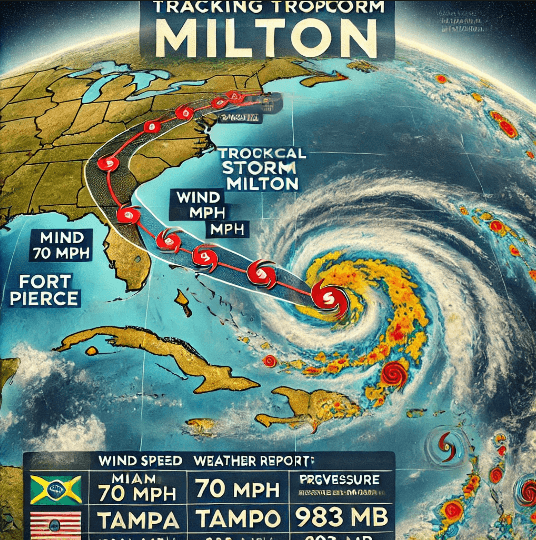Storm Coming to Florida: Focusing on Tropical Storm Milton
As Florida gears up for another storm season, the latest threat is Tropical Milton Storm Coming to Florida, which has the potential to evolve into a more severe system. Meteorologists are closely monitoring this storm, providing real-time data to help residents prepare. This blog provides an overview of the storm, its forecast, and how Floridians can get ready for what lies ahead.
Current Storm: Tropical Storm Milton
Meteorologists are closely monitoring Tropical Storm Milton, which is expected to intensify into a hurricane. Predicted to hit Florida’s west coast by Wednesday, this storm could reach Category 2 or 3, posing significant risks to residents in Tampa, Naples, and Fort Myers.
Forecasts predict:
- Landfall Time: Mid-week (Wednesday or Thursday)
- Location: The west coast of Florida
- Wind Speeds: Up to 110 mph (Category 2-3)
- Rainfall: Estimated 8-12 inches of rain in some areas, with flash flooding likely.
Authorities have issued hurricane watches for these areas and are urging residents to follow evacuation guidelines and prepare for the storm’s arrival.
Scientific Predictions: Meteorological models from NOAA and NHC show the storm’s path moving northeast across the Gulf of Mexico, where warm waters will likely fuel its intensity. Residents should stay updated with the latest forecasts, as conditions can change rapidly.
What’s the Latest with Tropical Storm Milton?
Tropical Storm Milton has formed in the warm waters of the Gulf of Mexico and is predicted to make landfall along Florida’s west coast. The storm is expected to intensify into a hurricane within the next 48 hours as it approaches, bringing high winds, heavy rainfall, and a threat of storm surges. According to the National Hurricane Center (NHC), wind speeds could reach up to 85 mph, potentially causing significant damage to homes and infrastructure along coastal areas.
What Are the Storm Coming to Florida Surge Possibilities?
The greatest danger from Tropical Storm Milton may come from the storm surge along Florida’s west coast. Areas such as Tampa Bay, Naples, and Fort Myers are under storm surge warnings, with 2 to 4 feet of surge expected along coastal regions. This surge, combined with heavy rain, could flood homes and roads. Coastal residents should heed evacuation orders and move to higher ground if directed by local authorities.
What’s to Be Expected with the Rest of Hurricane Season?
Florida’s hurricane season typically peaks between August and October, with the most intense storms forming in September. This year, weather experts are predicting above-average storm activity due to warm ocean temperatures and favorable atmospheric conditions. Residents can expect a few more named storms and potential hurricanes before the season ends, making it essential to stay prepared.
What’s the Forecast for Tropical Depression 14?
Tropical Depression 14 is another system brewing in the Atlantic, following closely behind Tropical Storm Milton. It’s expected to strengthen into a tropical storm over the next 24 hours and may eventually develop into a hurricane. Current models show that Tropical Depression 14 could track toward Florida’s eastern coastline, posing a dual threat to the state. This development emphasizes the importance of staying alert as the storm season progresses.
How Much Rain is Expected?
Both Tropical Storm Milton and Tropical Depression 14 are expected to bring torrential rain to large parts of Florida. Meteorologists are forecasting 8 to 12 inches of rain for central and southern Florida, with isolated areas potentially seeing up to 15 inches. This rainfall could lead to flash flooding, especially in low-lying areas and regions near rivers. Residents should prepare by securing homes, avoiding flooded streets, and keeping emergency supplies on hand.
Preparing for Tropical Milton Storm Coming to Florida and Beyond
As Tropical Storm Milton approaches, here are a few steps Floridians should take to prepare:
- Create an emergency kit with essentials such as water, non-perishable food, batteries, medications, and important documents.
- Secure your home by installing storm shutters, boarding up windows, and bringing outdoor items inside.
- Follow evacuation guidelines if you live in an area under evacuation orders.
- Stay informed by regularly checking weather updates from reliable sources such as NOAA or the National Hurricane Center.
FAQs about Storm Coming to Florida
What should I do if a storm is approaching?
Stay informed through local news and weather services, secure your home, gather an emergency kit, and follow evacuation orders if issued.
How can I prepare my family for a storm?
Create an emergency plan, discuss it with family members, and practice drills. Ensure you have an emergency kit with essentials, including food, water, and medications.
What is a storm surge, and why is it dangerous?
A storm surge is a rise in sea level due to storm winds. It can cause severe flooding and damage to coastal areas, making it crucial to heed evacuation orders.
How can I stay updated on storm developments?
Monitor official sources like the National Hurricane Center (NHC), local news outlets, and emergency management agencies for real-time updates.
What should I do after the storm has passed?
Check for hazards in your area, document any damage for insurance claims, and follow local guidelines regarding water safety and clean-up efforts.
Are there any apps I can use for storm alerts?
Yes, consider downloading weather apps like NOAA Weather Radar or The Weather Channel for real-time alerts and updates.
What are the chances of more storms developing this hurricane season?
Weather experts predict above-average activity for the rest of the season, so remain prepared for the possibility of additional storms.
Conclusion
As Tropical Storm Milton approaches Florida, now is the time to act. Stay informed about Storm Coming to Florida updates, understand the risks, and take necessary precautions. With Tropical Depression 14 also forming, Floridians must remain vigilant throughout the storm season to ensure their safety. Make sure you’re prepared for heavy rains, storm surges, and the possibility of more storms ahead.


